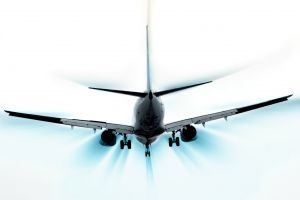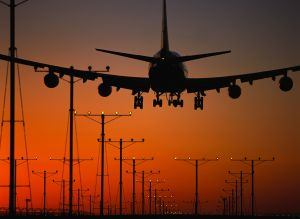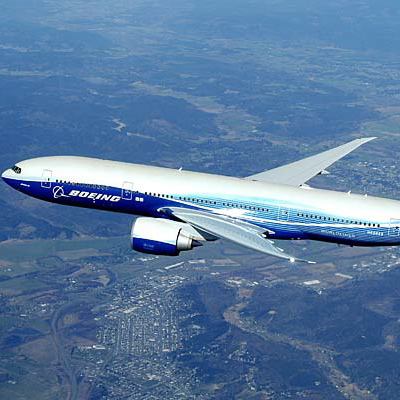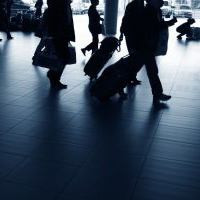The Travel Detective
Airline News: Delta’s Management, Continental Gets Economy Plus, Boeing’s Cabin Improvements
 As always, it’s been a busy couple of weeks in travel news. Not only are we learning about the aftermath of the Christchurch earthquake and watching events unfold in the Middle East, but there’s the ever-changing airline industry news.
As always, it’s been a busy couple of weeks in travel news. Not only are we learning about the aftermath of the Christchurch earthquake and watching events unfold in the Middle East, but there’s the ever-changing airline industry news.
Peter sat down with The Wall Street Journal‘s Scott McCartney to hash out everything from Delta sending its agents to charm school to major cabin renovations and the real reason behind the airlines’ improved baggage handling service.
Peter Greenberg: I recently ranted about Delta’s new idea of sending 11,000 of its front-line employees to “charm school.” What’s charming about saying “no” with a smile? Unless they change their management practices, sending 11,000 agents to charm school isn’t going to matter much.
Scott McCartney: One of the things that I found interesting was an apology that, last year, Delta management put their employees in terrible position. A lot of the dissatisfaction among Delta customers resulted from canceled flights. Why were flights canceled? Management had cut way back on spare parts, so it took much longer to get planes back in service. There were very few spare airplanes. They had cut back on staff so much that people were overworked. It was a recognition that employees were a) handed really angry customers because of management decisions and b) put in positions where they were overworked and frazzled.
 PG: I have an idea, why don’t we just cut back on management?
PG: I have an idea, why don’t we just cut back on management?
SM: I think there’s been some of that in the merger, but knowing how things go that often doesn’t happen.
UNITED’S ECONOMY PLUS SPREADS TO CONTINENTAL
PG: Speaking of mergers we have United merging with Continental. One of United’s more successful attempts at seating was its Economy Plus section for people who didn’t want to pay a premium for business but were happy to sit in a nicer coach seat for a little bit more money. That looks like that’s going to continue on with Continental.
SM: I think this is a really big thing. I think travelers on United really loved Economy Plus. If you’re elite level you get it for free. If you’re tall you have the chance to buy up into it. We’re talking 4 to 6 inches of leg room. You don’t get any different service, you don’t get a wider seat, but you do get more leg room. That can be the difference between sleeping and not sleeping, between being able to work on your laptop and not being able to work on your laptop. Just being able to move your legs around is important.
Get more of Peter’s thoughts on travel in the Travel Detective Blog section
 The trade-off is you have to take seats off the airplane so it costs the airline money. United said they were able to get enough additional revenue out of selling an upgrade to those seats to make up for it. A lot of Continental managers took over in the merger and I think a lot of people were worried when they started crunching the numbers. But not only are they keeping it in United, they’re expanding it into Continental. Even if you have to pay more for it, it’s nice to see the opportunity to get more comfort in coach.
The trade-off is you have to take seats off the airplane so it costs the airline money. United said they were able to get enough additional revenue out of selling an upgrade to those seats to make up for it. A lot of Continental managers took over in the merger and I think a lot of people were worried when they started crunching the numbers. But not only are they keeping it in United, they’re expanding it into Continental. Even if you have to pay more for it, it’s nice to see the opportunity to get more comfort in coach.
PG: I understand that if you sit in Economy Plus now they show you pictures of the food they would have served you five years ago, is that true?
SM: The really interesting thing is Economy Plus is essentially what economy used to be. You could have just as easily called it Economy Old.
PG: There’s branding for you, “Come on board Economy Old, our planes are as old as our seats.”
SM: “Behind you are the new sardine seats.”
Check out a previous interview with Scott McCartney here: Frequent-Flier Program Changes & Other Airline News
BOEING’S AIRIER NEW CABINS
PG: You did a piece in The Wall Street Journal on the fact that they’re actually getting a little bit smarter with head room on some of these planes.
 SM: Boeing came up with a new overhead bin design for narrow-bodied aircraft. It’s a lot like some of the bins you see on wide-bodied aircraft. Essentially on 737s they’ve been able to put in a bin that pivots. When you close it, it angles up into the ceiling. To do this they had to move pipes and electrical stuff into a different place in the ceiling. It’s a huge redesign of the interior of the airplane. It’s got fancy lighting; it’s got redesigned window coverings, and casings, and shade so it opens up the windows more. It’s a much more comfortable, much more open cabin.
SM: Boeing came up with a new overhead bin design for narrow-bodied aircraft. It’s a lot like some of the bins you see on wide-bodied aircraft. Essentially on 737s they’ve been able to put in a bin that pivots. When you close it, it angles up into the ceiling. To do this they had to move pipes and electrical stuff into a different place in the ceiling. It’s a huge redesign of the interior of the airplane. It’s got fancy lighting; it’s got redesigned window coverings, and casings, and shade so it opens up the windows more. It’s a much more comfortable, much more open cabin.
But the real difference is in an aisle seat you can stand up when the bin is closed and not bump your head. Just moving those bins at an angle up into the ceiling more opens up the whole cabin and then makes it feel larger, even though it’s the same small tube. This is a little bit more expensive and the interesting thing 60 airlines on Boeing’s books are opting for the nicer cabin.
PG: Of course, even though it looks nicer and there is more head room, just because your suitcase has wheels on it doesn’t mean it’s portable. I’ve seen people try to bring in drive shafts of BMWs, a dead moose, and their old grandmother stuck in a large canvas bag with wheels and try to get it up on the overhead compartment. What you’re seeing may be an airier cabin, but that doesn’t mean you can cram more stuff in there.
SM: That’s right. The bins that they have in there actually hold four more rollaboard bags, but they’re measuring that at something like 108 bags that are 14 inches wide. But people bring all kinds of stuff. Do the math: 108 bags and 150 passengers, so there’s still going to be a real competition for overhead bin space.
More on Boeing: Boeing Redesigns 747 To Be Leaner, Greener, Quieter
 AIRLINES LOSING (AND HANDLING) FEWER BAGS
AIRLINES LOSING (AND HANDLING) FEWER BAGS
PG: Now, with the exception of Southwest, the airlines have been charging for checked bags. You did a story not that long ago saying that they’re now losing fewer bags.
SM: Yes,they’re handling fewer bags, and people are trying to cram it all into the overhead bin to avoid the checked bag fee. Baggage has become a revenue-generating area, but I think they’re way behind on baggage technology. There are thngs like portable hand-held scanners that FedEx and UPS have been using for years and years and years.
But, with people trying to avoid the checked-bag fees, they’re being more careful about how they pack. That’s all resulted in more effective baggage handling. It’s not just that they’re losing fewer bags, the rate that they’re losing bags has dropped about 10 percent. So an improvement in service is a good thing.
PG: But they’re charging you $25 to $35 a bag every time you’re checking in. The technology, as you said, does exist with radio frequency identification devices (RFID). You put a little chip on there that will cost the airlines 50 cents a bag and they’ll never be able to lose it.
SM: I think the price is even down below that. When RFID first came out they were saying, it’s too expensive it will cost us a dollar a bag tag, or something like that. I think the price has come down substantially. A couple of places are trying this. The Las Vegas airport puts RFID tags on bags, and there have been some tests in other parts of the world. It is much more accurate.
By Peter Greenberg for Peter Greenberg Worldwide Radio.
Related links on PeterGreenberg.com:
- Frequent-Flier Program Changes & Other Airline News
- Southwest Joins Other Airlines In Latest Round Of Fare Increases
- Boeing Redesigns 747 To Be Leaner, Greener, Quieter
- Air Travel News – Airlines & Airports section
- Travel Detective Blog section












